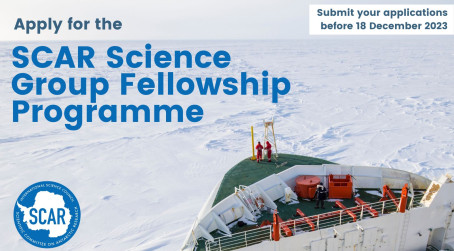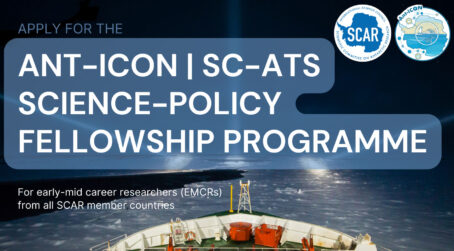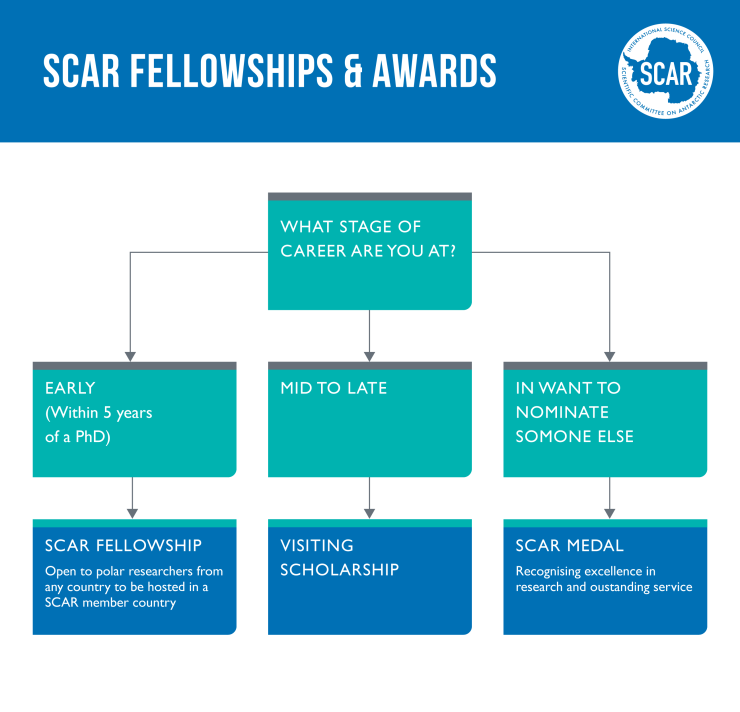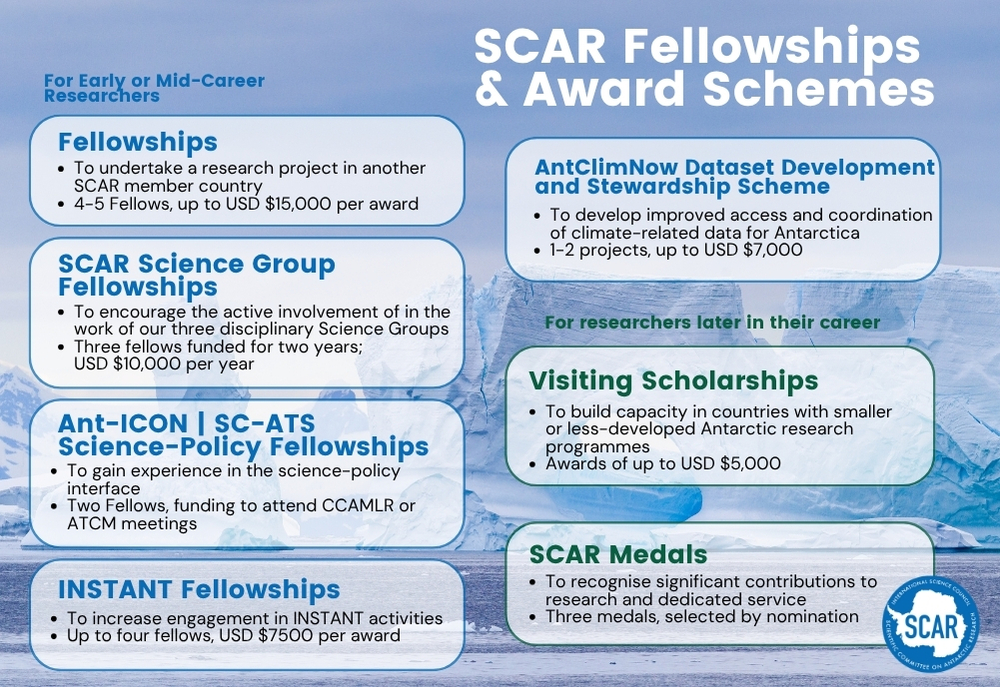

Fellowships & awards
Fellowships
Early-career Fellowships enable early-career researchers to join a project team from another country, opening up new opportunities and often creating partnerships that last many years and over many Antarctic research seasons.
Eligibility: Current PhD researchers or within 5 years of finishing a PhD, visiting a facility in or run by a SCAR member country, whose research contributes to SCAR’s objectives as embodied in the Science Groups and Scientific Research Programmes.
Currently open. Deadline 31 July 2025

Visiting scholarships
The Visiting Scholar Awards are directed at researchers and academics whose work contributes to the research objectives of SCAR, offering the opportunity for them to undertake a short-term visit to another SCAR member country to provide training and mentoring.
Eligibility: The scheme is for any scientists and academics (more than five years after completing their PhD), whose research contributes to SCAR’s objectives as embodied in the Science Groups and Scientific Research Programmes. Eligibility: Current PhD researchers or within 5 years of finishing a PhD, visiting a facility in or run by a SCAR member country, whose research contributes to SCAR’s objectives as embodied in the Science Groups and Scientific Research Programmes.
Currently open. Deadline 31 August 2025

SCAR medals
SCAR aims to recognize members of the community who have outstanding records of achievement in the areas of research and service by awarding SCAR Medals. Medals are awarded biennially at the SCAR Open Science Conferences.
- Medal for Excellence in Antarctic Research
- Medal for International Coordination
- Medal for Education and Communication
If you can’t find the information you need, please email [email protected] and the SCAR Secretariat will be happy to help.
Currently closed
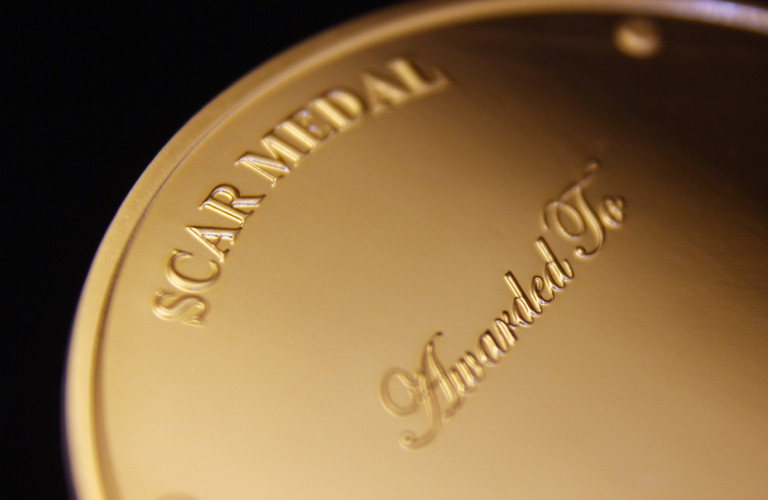
Additional Fellowship & Award Schemes

Capacity Building, Education and Training
Why does SCAR do Capacity Building?
Training, support and development of the Antarctic community are fundamental to SCAR. The SCAR Fellowships aim to facilitate collaboration and knowledge-transfer between researchers and institutions. SCAR also encourages and rewards excellence in Antarctic research, as well as outstanding service to the research community, through a performance recognition scheme in the form of biennially awarded SCAR medals. SCAR assists educators, students, and early-career researchers, and helps under-represented groups and emerging programmes to participate in SCAR’s activities and Antarctic research. SCAR promotes and facilitates the incorporation of Antarctic research into the educational landscape.
SCAR is committed to helping researchers in all of its Member countries and beyond to
- participate in understanding the physical, biological, chemical and geological
- processes at work in the Antarctic region
- use that understanding to predict change both there and elsewhere in the world,
provide objective and independent advice to policy makers, especially the Antarctic Treaty System.
To achieve these goals requires that efforts be made to raise national scientific capacities, especially in developing countries.
Opportunities SCAR offers
Early-Career Fellowships: Fellowships enable early career researchers to join a project team from another country, opening up new opportunities and creating partnerships. In 2022 additional support is being provided by the Prince Albert II of Monaco Foundation through the Polar Initiative.
Visiting Scholarships: The visiting scholar scheme is aimed to researchers and academics (more than five years after completing their PhD), and offers the opportunity to undertake a short-term visiting to another SCAR member country to provide or receive training and mentoring.
SCAR Medals: SCAR medals recognise excellence in Antarctic and Southern Ocean research and outstanding service to the international Antarctic community.
Please refer to the flowchart below for guidance on who is eligible for each of our programmes. Click the image to be taken to the PDF version.
If you can’t find the information you need, email info-at-scar.org and the SCAR Secretariat will be happy to help.
12th SCAR Open Science Conference
The 12th SCAR Open Science Conference is heading to Oslo, Norway, 10–14 August 2026!
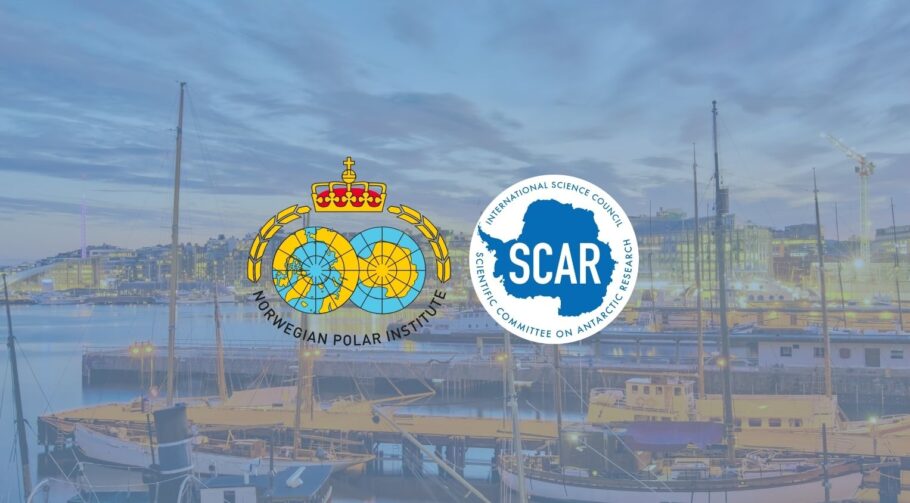
© Copyright 2025 SCAR | Website by Union 10 Design

